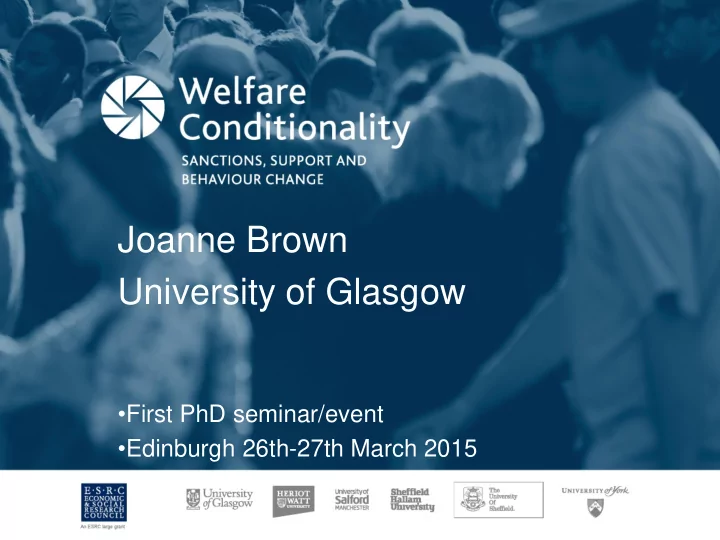

Joanne Brown University of Glasgow • First PhD seminar/event • Edinburgh 26th-27th March 2015
Welfare conditionality for disabled benefit recipients
Aim & objectives • What are the lived experiences of conditionality for both front-line welfare advisors and disabled welfare recipients? • How, and to what extent, do the interactions between advisors and recipients shape the implementation and application of welfare policy? • What factors impact the way conditionality is experienced in practice?
Key concepts • Conditionality – • Conditions of category • Conditions of circumstance • Conditions of conduct (Clasen & Clegg, 2007)
Key concepts • Activation • Welfare recipients • Disability
Rationale • Impact of The Welfare Reform Act (2012) • Significance of work focused welfare • Individual responsibility • Focus on economic contribution
Policy context • ‘Simplifying the welfare system and making sure work p ays’ • The introduction of Universal Credit (UC); • The introduction of Personal Independence Payments (PIP) in replacement of Disability Living Allowance (DLA); • Restrictions to Housing Benefit entitlement (‘removal of spare room subsidy’ or ‘bedroom tax’); • The continuation of moving existing Incapacity Benefit recipients to ESA; • Time limiting the contributory Employment and Support Allowance to 12 months.
Conditionality & disability? • ‘Conditionality is a blunt instrument when applied to disabled people living in a society which continues to erect disabling barriers to their inclusion and full participation’ (Patrick, 2011).
Methodology • Disability studies • Qualitative paradigm • Semi-structured interviews & observations
Methodology • Welfare recipients & welfare advisors (street level bureaucrats) • Working with ‘vulnerable’ adults • Participatory principles
So far… • Establishing access • Working alongside organisations • Starting to transcribe
Data collection • A sense of ‘being lucky’ • The unsupportive support group • Inadequate training or jobs • Accessibility
“I applied for Employment Support Allowance with my CPN, my community psychiatric nurse at the time and luckily and I was awarded that. I then had to go. They sent all this information and stuff but I had to go for an assessment with them but I was in hospital and I wasn’t allowed out. So I couldn’t go and then I got discharged in the October, to semi - supported living and then I had to go to the Job Centre. But my appointment was in January and it was the day of my mum’s funeral so my support worker rang and cancelled that and made another one and then I went and she said you cancelled your last appointment. I said well yeah it was my mum’s funeral and my support worker rang and told you why. And she said um so what steps have you took to get back into work?”
Conclusions • Lived experiences of conditionality • Focus on conditionality for disabled people • Agency vs. structure • Policy into practice
Recommend
More recommend